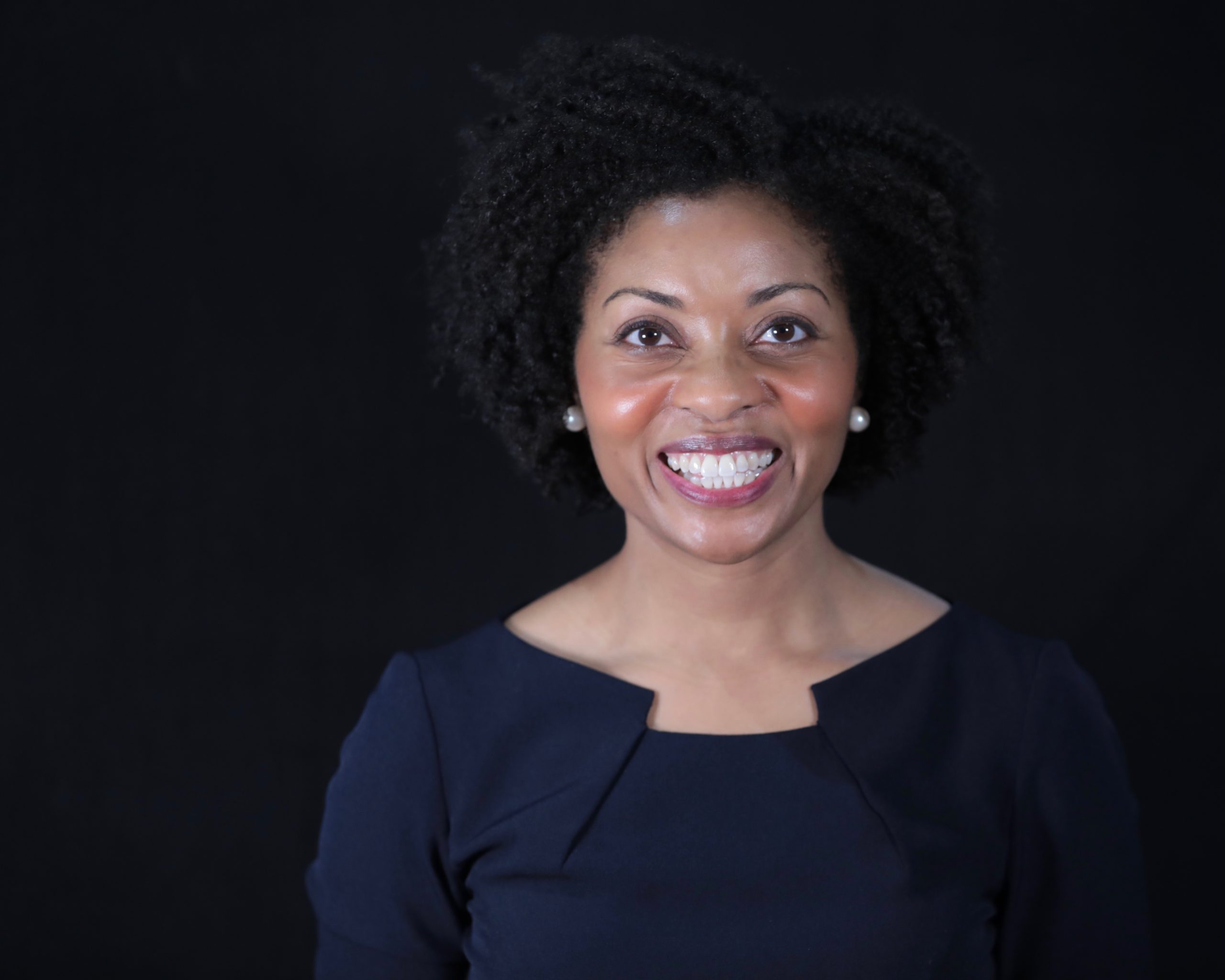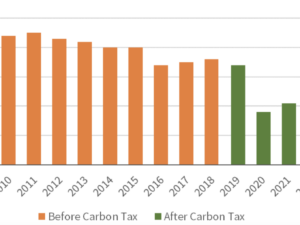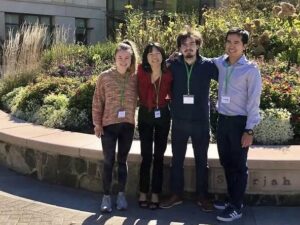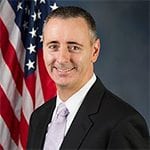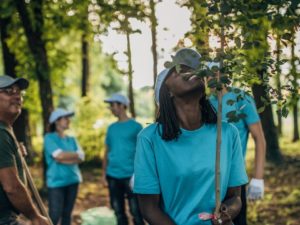Citizens’ Climate Radio is a monthly podcast hosted by CCLer Peterson Toscano. Browse all our past episode recaps here, or listen to past episodes here, and check out the latest episode in the post below.
We live in a world with stronger and more frequent extreme weather events. As a result, giving and receiving hospitality is becoming the new normal for humans. Citizens’ Climate Radio host Peterson Toscano speaks with public theologian Jayme R. Reaves and public health expert Dr. Natasha DeJarnett (pictured above). What are the risks leading to more displacement? What are the dilemmas and challenges of housing, feeding, and creating more space for people uprooted from homes during extreme weather? And what are some of the creative ways communities provide protection to those temporarily or permanently unhoused?
Jayme R. Reaves is the director of academic development at Sarum College in Salisbury, England. She teaches in areas such as biblical studies, and feminist and liberation theology. Over the last 20 years, she has worked as a consultant, researcher, lecturer, and facilitator in the U.S., former Yugoslavia, Northern Ireland, and Great Britain. Her focus internationally has been on the intersections between theology and public issues such as peace, conflict, hospitality, memory, and gender.
Jayme discusses the roles that scarcity and abundance play in making sure that those most impacted by the environment in the community around us are cared for. She calls on churches to work in their own communities to make congregations aware of sharing with those who don’t have as much.
Jayme regularly speaks, leads retreats, conducts workshops, and acts as “theologian in residence” with communities who wish to dive deeper into understanding theological frameworks for social justice activism. She’s the author of “Safeguarding the Stranger: An Abrahamic Theology & Ethic of Protective Hospitality” (Wipf & Stock, 2016) and co-editor of “When Did We See You Naked?: Jesus as a Victim of Sexual Abuse” (SCM, 2021).
Additionally, she co-hosts the podcast Outlander Soul, which looks at the Outlander series by Diana Gabaldon with a theological, religious, and spiritual lens and takes seriously the role fiction plays in fans’ lives as a sacred text. Jayme lives in Dorset, England with her partner and two dogs.
Dr. Natasha DeJarnett is an assistant professor in the Christina Lee Brown Environment Institute at the University of Louisville Division of Environmental Medicine, researching the health impacts of extreme heat exposure and environmental health disparities. Additionally, she is a professorial lecturer in Environmental and Occupational Health at the George Washington University Milken Institute School of Public Health. Previously, Dr. DeJarnett was the interim associate director of Program and Partnership Development at the National Environmental Health Association, leading research, climate and health, and children’s environmental health.
She also previously served as a policy analyst at the American Public Health Association (APHA), where she led the Natural Environment portfolio, including air and water exposures along with climate change. Dr. DeJarnett is a member of the EPA’s Children’s Health Protection Advisory Committee, is chair of the Governing Board of Citizens’ Climate Education, a member of the Board of Directors of Physicians for Social Responsibility, chair-elect for APHA’s Environment Section, member of the Advisory Board of APHA’s Center for Climate, Health and Equity, a member of the Board of Trustees for the BTS Center, special advisor to the Environmental Health and Equity Collaborative, and the Steering Committee of the International Transformational Resilience Coalition.
Dr. DeJarnett emphasizes that more than ever before, people are being displaced as a result of severe weather phenomena caused by climate change. In 2018, 16 million people were displaced due to climate, 1.2 million of which were American. She points out that in 2020, more hurricanes and tropical storms made landfall than ever before, to the point where letters in the Greek alphabet were being used to name them, as the list of hurricane names had been used up. Dr. DeJarnett says that church communities are presented with the opportunity to provide hospitality more than ever by turning churches into cooling centers, and by educating the community about staying safe through weather phenomena.
To learn more about building community resilience see the US Climate Resilience Toolkit or see how you can get involved with establishing a local or regional Climate Resilience Hub.
The Art House
Joining us in the Art House is Dr. Krista Hiser with The Ultimate Cli-Fi Book Club. The purpose of the book club is to look at climate-themed literature and consider how it can help us engage differently with interdisciplinary topics and existential threats related to the planetary predicament of climate change.
In this episode, Krista reflects on Deena Metzger’s novel “A Rain of Night Birds.”
Dr. Krista Hiser is Professor at Kapiʻolani Community College. Her Ph.D. is in Educational Administration from the University of Hawai‘i at Mānoa. She has published works on community engagement, service-learning, organizational change, post-apocalyptic and cli-fi literature.
In this month’s episode, Krista tells us that the protagonist of “A Rain of Night Birds” is a scientist that also relies on feeling to gauge the environmental phenomena around her. With themes of spiritualism and indigenous culture, this “literature of restoration” focuses on the concept of doing no harm, based on the importance of the world around us.
You can read a written version of Krista’s essay at The Ultimate Cli-Fi Book Club for Sustainability in Higher Education on Medium.
You can hear standalone versions of The Art House at Artists and Climate Change.
Good News Report
Our good news comes from Anthony Leiserowitz at Yale Climate Connections. In tune with the theme of hospitality, Anthony discusses a disaster resiliency program geared toward Spanish-speaking residents in Sonoma County, California.
Whether people lose power or work as a result of climate and weather disasters, many nonprofits are developing plans and guides to help Spanish speakers in the west prepare. These programs help residents sign up for emergency alerts, prepare for emergencies, and make financial arrangements needed to safely leave during severe weather.
We always welcome your thoughts, questions, suggestions, and recommendations for the show. Leave a voicemail at (518) 595-9414 (+1 if calling from outside the USA). You can email your answers to radio@citizensclimate.org.
You can listen to Citizens’ Climate Radio on these platforms:
Also, feel free to connect with other listeners, suggest program ideas, and respond to programs in the Citizens’ Climate Radio Facebook group or on Twitter at @CitizensCRadio.
Citizens’ Climate Radio is a monthly podcast hosted by CCL volunteer Peterson Toscano.

